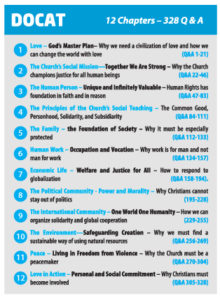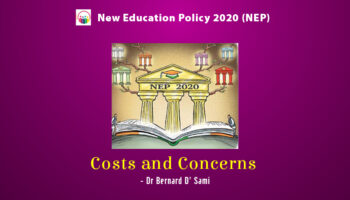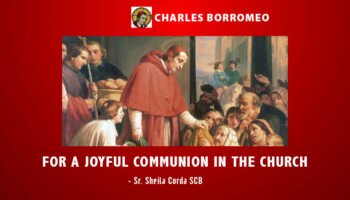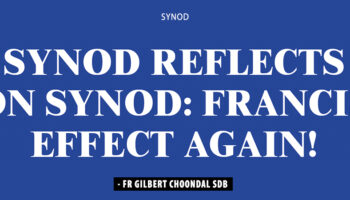We are all quite familiar with the book “YOUCAT” – the  Youth Catechism which is an adaptation of the great
Youth Catechism which is an adaptation of the great
Catechism of the Catholic Church for young people. After YOUCAT was launched in 2011, many young Catholics started asking: “Now we know what our faith is, but what do we do? What do we do to put our faith into action?” The Church’s answer to this question is another little cat – the “DOCAT” (pronounced “Do – Cat”).
DOCAT is a popular adaptation of the social teachings of the Catholic Church. Prepared by a team of experts with the participation of young Catholic men and women from all over the world, DOCAT carries the liberating message of Catholic social doctrine.
The book takes the readers through a basic catechesis covering twelve topics (see box). Each chapter is broken up into relatively short chunks of text in Question-and-Answer format.
DOCAT is written in a lighter, breezier style and is both comprehensive and comprehendible. It aims at helping youth and others in conscience formation and Gospel-based action on social and political issues such as poverty, labour, environment, peace, unemployment, imbalance of wealth, immigration, abortion, and others.
DOCAT also features inspirational and insightful quotes from Catholic leaders and saints, including St. Pope John Paul II, Mother Teresa, Pope Francis and Pope Benedict. The book frequently quotes social encyclicals beginning from Leo XIII’s Rerum Novarum (1891), and also from such documents as John Paul II’s Familiaris Consortio and Evangelium Vitae.
In his Introduction to DOCAT, Pope Francis says, “It is like a user’s manual that helps us change ourselves with the Gospel first, and then our closest surroundings, and finally the whole world.” DOCAT helps young people to know and live Catholic Social Teaching. It shows young people how to work toward building a “civilization of love”.
Gospel foundation
In his Introduction to DOCAT, Pope Francis says, many saints were shaken to the core by Jesus’ statement in the Gospel: “As you did it to one of the least of these my brethren, you did to me.” On account of it, Saint Francis of Assisi changed his whole life; Mother Teresa left Loreto convent and set in motion the saga of the Missionaries of Charity; Bl. Charles de Foucauld declared that in all of the Gospels, there was no saying that changed his life more deeply than this.
Pope Francis traces the beginnings of what we call Catholic Social Teaching today: In the nineteenth century when, with industrialization, a brutal form of capitalism arose: a sort of economy that destroyed human beings. Unscrupulous industrialists reduced the impoverished rural population to the point where they toiled in mines or in rusty factories for starvation wages. Children no longer saw the light of day. They were sent underground like slaves to pull coal carts. With great commitment, Christians offered aid to those in need, but they noticed that that was not enough. So they developed ideas for counteracting injustice socially and politically as well. Actually the fundamental proclamation of Catholic social doctrine was and is the 1891 encyclical letter by Pope Leo XIII, Rerum novarum, “On Capital and Labour.” In it, Leo XIII wrote clearly and unmistakably: “To defraud anyone of wages that are his due is a great crime which cries to the avenging anger of Heaven.” With the full weight of her authority, the Church fought for the rights of the workers.
Responding to the needs of the time, over the years, Catholic social teaching got increasingly enriched and renewed. Pope Francis says, “Actually this social doctrine does not come from any particular pope or from any particular scholar. It comes from the heart of the Gospel. It comes from Jesus himself. Jesus is the social teaching of God.”
An Economy that Kills
Commenting about today’s globalized economy in Evangelii Gaudium, Pope Francis said, “This economy kills”, for today an economy of exclusion and disparity of incomes still exists. There are countries in which 40 or 50 percent of the young people are unemployed. In many societies, older people are marginalized because they seemingly have no “value” and are no longer “productive”. Great stretches of land are depopulated because the poor of the earth flee to the slums of the major cities in the hope of finding something left there on which to survive. The production methods of a globalized economy have destroyed the modest economic and agricultural structures of their native regions. By now, approximately 1 percent of the world’s population owns 40 percent of the entire wealth of the world, and 10 percent of the world’s population owns 85 percent of the wealth. About 1.4 billion human beings live on less than one euro (Rs. 70) per day. Pope Francis calls on the youth to fight the “economy that kills” with the “Gospel that gives life”.
To Change the World, be a Walking Social Doctrine
Pope Francis says when he invites young people to really get to know the social doctrine of the Church, he is dreaming not just about groups that sit under trees and discuss it. That is good! Do that! “My dream,” says the pope, “is of something greater: I wish I had a million young Christians or, even better, a whole generation who are for their contemporaries “walking, talking social doctrine”. Nothing else will change the world but people who, with Jesus, devote themselves to it, who with him go to the margins and right into the middle of the dirt. Go into politics, too, and fight for justice and human dignity, especially for the poorest of the poor.
The pope continues, “Dear young friends! Only conversion of heart can make our world, which is full of terror and violence, more humane. And that means patience, justice, prudence, dialogue, integrity, solidarity with victims, the needy, and the poorest, limitless dedication, love even unto death for the sake of the other. When you have understood that quite deeply, then you can change the world as committed Christians. The world cannot continue down the path that it is taking now. If a Christian in these days looks away from the needs of the poorest of the poor, then in reality he is not a Christian!“
DOCAT is clearly a fresh invitation to Catholics to be active, to learn, to engage others and work for justice in solidarity with present and future generations.

– Fr K. J. Louis SDB
To subscribe to the magazine Contact Us





